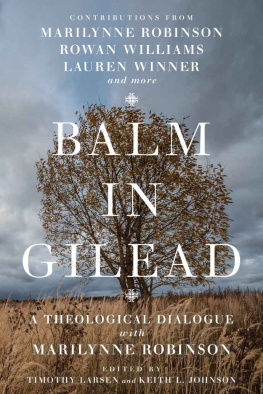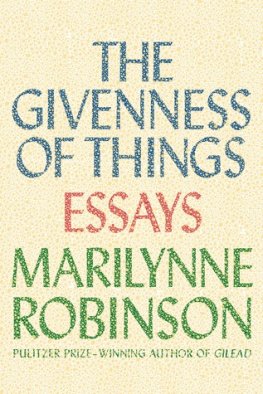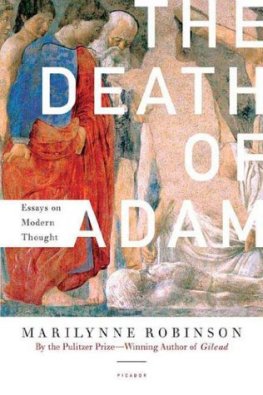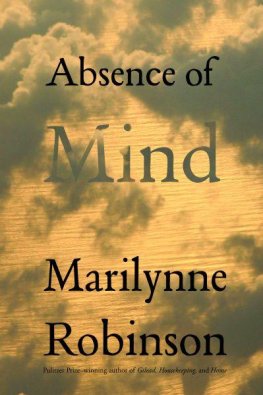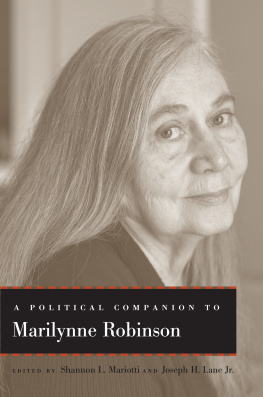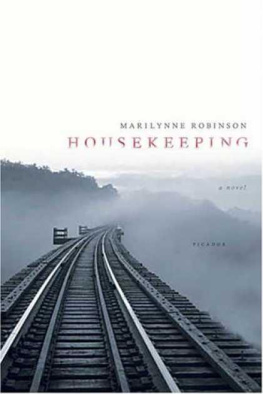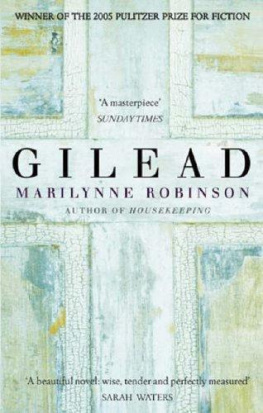BALM
IN
GILEAD
A THEOLOGICAL DIALOGUE
with
MARILYNNE ROBINSON
EDITED BY
TIMOTHY LARSEN and KEITH L. JOHNSON
FOR SHAWN E. OKPEBHOLO
Composer, Colleague, and Friend
Contents
Introduction
Timothy Larsen and Keith L. Johnson
The Theological World of the Reverend John Ames
Timothy Larsen
Heart Conditions: Gilead and Augustinian Theology
Han-luen Kantzer Komline
Marilynne Robinson and John Calvin
Timothy George
The Metaphysics of Marilynne Robinson
Keith L. Johnson
Thinking About Preaching with Marilynne Robinson
Lauren F. Winner
Marilynne Robinson and the African American Experience
Patricia Andujo
Space/Time/Doctrine: Marilynne Robinsons Gilead Novels
Tiffany Eberle Kriner
Heaven and Earth - Reading Gilead Through the Landscape of the Fox River
Joel Sheesley
Beyond Goodness - Gilead and the Discovery of the Connections of Grace
Rowan Williams
The Protestant Conscience
Marilynne Robinson
A Conversation Between Marilynne Robinson and Rowan Williams - Moderated by Vincent Bacote and Christina Bieber Lake
Moderated by Vincent Bacote and Christina Bieber Lake
An Interview with Marilynne Robinson
Philip Ryken
Acknowledgments

IT TAKES A CAMPUS TO host a theology conference. We are grateful to everyone who helped to make this event a success, not least all of our colleagues in the biblical and theological studies department and in the English department (whose kind, self-sacrificing chair is Jeffry Davis). We were blessed with full, wholehearted administrative support from President Philip Ryken, Provost Margaret Diddams, and a cadre of once-and-future deans: Lynn Cohick, David Capes, Jeffry Davis, Sarah Miglio, and Jill Pelez Baumgaertner. We owe an incalculably great debt to Krista Sanchez, an administrative assistant in our department who served as the conference coordinator. Krista had the terrifying task of being thrown during her first weeks on the job into organizing one of the largest, most complicated, and high-profile conferences in college history. The credit for the successful implementation of the vision for this event goes in large measure to her. The same can be said on the other end of the planning regarding Marilynne Robinsons administrative assistant, Margaret MacInnis. Margarets efficiency, good cheer, and commitment to this conference were crucial at every stage: interacting with her has always been a joy. Another outside partner that we are truly thankful for is the long-standing sponsor of the Wheaton College Theology Conference, InterVarsity Press. We are grateful in particular to our supportive editor there, David McNutt.
Another way that this theology conference stood out from most others was through the inclusion of world-class musical performances. For several years now, amid many other projects, the award-winning composer Shawn Okpebholo has been reimagining Negro spirituals and classic Christian hymns. The first track on his haunting album Steal Away (2014) is Balm in Gilead. The beloved baritone Roberts Sims sang it as our corporate anthem to open the conference, accompanied by other distinguished, professional musicians: Paul Snchez on piano and Caen Thomason-Redus on flute. Thereafter, the music at the conference consisted of debut performances of Okpebholos reimagined compositions, dedicated by him to Marilynne Robinson. One of these pieces even included Robinsons favorite hymn, Wondrous Love. We are pleased to announce that these compositions will be included in Okpebholos next album, a continuation of the project that began with Steal Away. Okpebholo teaches music composition and theory on the faculty of Wheaton Colleges Conservatory of Music, and we are honored to have him as a colleagueand, even more so, as a friend. Shawn, we dedicate this book to you as a token of our deep and enduring appreciation of your life and work.
Introduction
Timothy Larsen and Keith L. Johnson

THE PULITZER PRIZE-WINNING novelist Marilynne Robinson is one of the most eminent public intellectuals in America today. In 2016, Time magazine even identified her as one of The 100 Most Influential People in the world. She is a fellow of the American Academy of Arts and Sciences and, until her recent retirement, was a professor of English and creative writing at the preeminent writing program in the United States, the Iowa Writers Workshop, at the University of Iowa, Iowa City. Elegant and probing meditations on the Christian faith often grace her work. Her series of novels, Gilead, Home, and Lila, evocatively and sympathetically present the lives, families, and spiritual convictions of two Protestant ministers in mid-twentieth-century Iowa. Robinsons essaysgathered in collections such as The Death of Adam, When I Was a Child I Read Books, and The Givenness of Thingsalso regularly contemplate theological themes. Many of these reflections are grounded in her defiant judgment that the sixteenth-century Protestant Reformer John Calvin still deserves a hearing in the twenty-first century. There is no major novelist working today whose life, thought, and writings more invite a sustained and substantial theological dialogue than Marilynne Robinson.
Every April for over a quarter of a century now Wheaton College has held its annual theology conference. It is a tribute to Marilynne Robinsons rarified place of intellectual significance in the world thatover all these years and decadesthis conference has only ever once before been dedicated to the work of a living figure. This book is the result of the twenty-seventh annual Wheaton Theology Conference which was held April 5-6, 2018, in Edman Chapel at Wheaton College, Wheaton, Illinois.
Moreover, this theology conference was not the kind which interacts with a living figure only after they have ceased to write and their contribution can be assessed as complete. Rather, it was a gathering interacting with a living author, whose works, if discovered now, can only be encountered, as it were, in media res. Indeed, Marilynne Robinson is currently in a highly productive phase. Just weeks before the conference began, some of us at Wheaton eagerly obtained our rushed, preordered copies of Robinsons latest collection of essays, What Are We Doing Here? Likewise, although this conference had been planned two years in advance, just a little over a month before it was held we were overjoyed to read in the press that Robinson had signed a contract for another novel. At the conference itself, she revealed in a public session that this novel would once again be set in the world of Gilead. In private, Robinson added that it would focus on the character of Jack and that she might be just a few months away from having a full draft. Throughout this present volume, contributors refer to the Gilead trilogy but, given this delightful announcement, future volumes on Robinson presumably will need to refer to the Gilead quartet.

